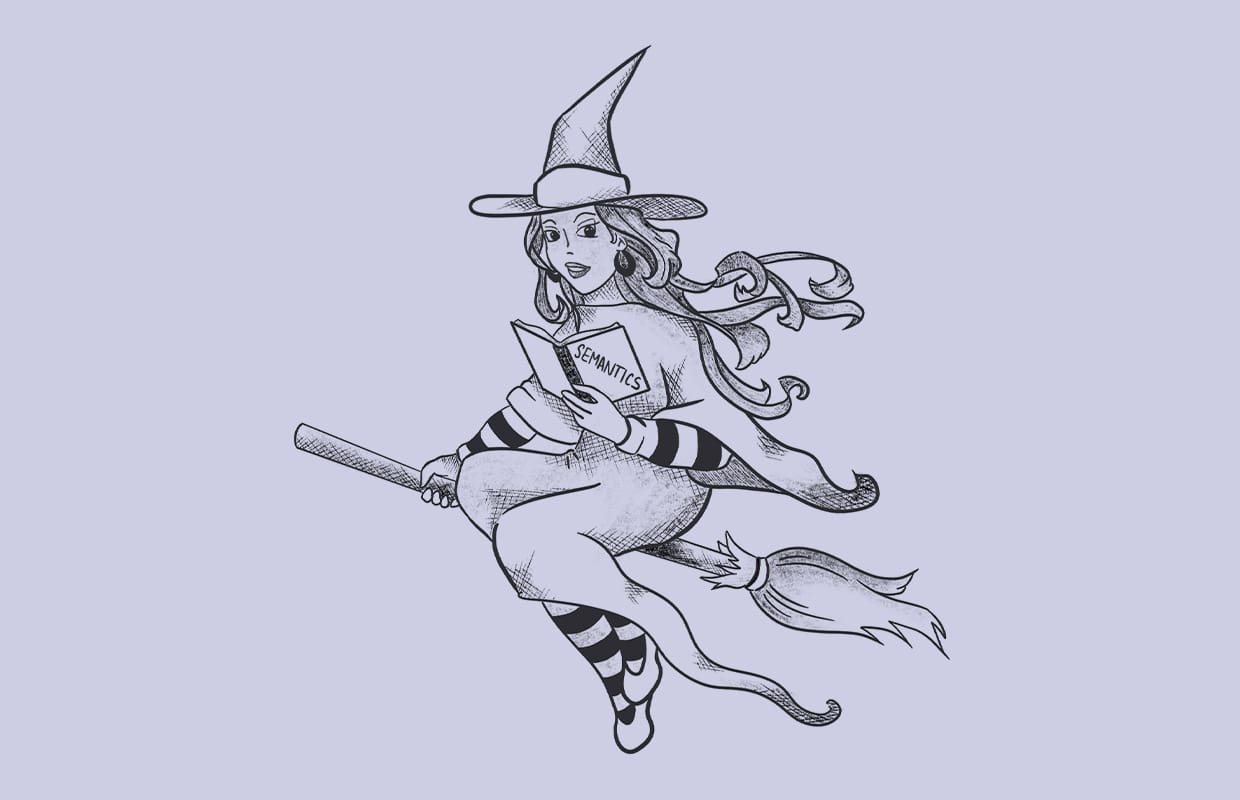At one point in time, the words “witch” and “wizard” were simply gendered versions of the same concept: a magical person. Over time, however, one of those words has taken on another, more negative meaning. According to the Oxford English Dictionary, “witch” can be used as “a term of abuse or contempt for a woman, especially one regarded as old, malevolent, or unattractive.” Why is it that “witch” has come to mean something so pejorative, and no such thing has happened to “wizard”? I’m going to take you through the way that language evolves, and, in doing so, cast some light on the sexism baked into our language.
First, let’s understand what it means for meanings to change over time. We all understand words as having meanings; if we didn’t, nobody would be able to understand what this article is saying. These meanings are not static. They change with time and differing contexts. Some examples of semantic change are quite drastic: “bully” used to be an affectionate term for a sweetheart, and now means something quite different. In this article, I’ll be focusing on two particular types of semantic change: pejoration and amelioration. Both refer to the value judgements contained within words changing over time, with pejoration being a change towards negativity and amelioration towards positivity. “Bully” is an example of pejoration — a term with a positive value judgement became something negative. Semantic change happens all the time, often without us realising.
The question, then, is why does this happen? What drives semantic change? This is something hotly contested within the field of linguistics, so, unfortunately, I can’t give a definitive answer. I can, however, offer some theories. One is that the value judgements imbued in words change in tandem with social attitudes. An example is the way that words which refer to the LGBTQIA+ community have, arguably, ameliorated over time. Of course, there have always been people who used words like “gay” in a positive way, but in mainstream discourse, “gay” has gone from something taboo, or, in bigoted or ignorant settings, insulting, to something reclaimed in a positive way. Sometimes this happens organically. As society becomes more accustomed to new ideas, the judgemental power of a word is undermined. Other times, this change happens forcibly. Part of the civil rights movement in the US was the forcible amelioration of the word “black” in reference to African Americans, consciously recontextualising it as a positive thing rather than something derogatory. This trend makes sense — as our attitudes get more liberal, so do the value judgements in our language.
There is one peculiar exception to this explanation that I’d like to explore. Arguably, attitudes towards women in Western contexts have only gotten more progressive over time. This, however, is not reflected in our language. As with the example of “witch” and “wizard”, there are many instances of ‘apparent duals’ — sets of words whose meaning is differentiated only by gender — for which the feminine version of the word has pejorated, and the masculine version either hasn’t changed or has ameliorated. “Courtier” and “courtesan” are an apparent dual, both being terms for members of a court. “Courtier”, the masculine, has not changed meaning over time. “Courtesan” has taken on the meaning of a sex worker, which (unfairly) carries negative connotations. “Master” and “mistress” were both initially honorifics for unmarried people. “Master” has actually ameliorated, to become someone who is skilled at something, while “mistress” carries the negative judgement of an adulterer. Other similarly pejorated duals are “bachelor” / “spinster”, “buddy” / “sissy” (being derived from “brother” and “sister” respectively), and “governor” / ”governess”. Time and time again, we see words that are feminine-coded which have degraded with time into something that is, at best, belittling, and, at worst, insulting.
Sexism exists elsewhere in English too. Many pejorative terms are semantically coded with gender. “Bitch” initially referred to female dogs. “Pussy” and “cunt” are both slang terms for the vagina. In some instances, these words are intended to be insulting in specifically gendered ways. Calling a woman a “bitch” implies that she has negative characteristics stereotypically associated with women — being bossy or catty. To call anyone else a bitch ascribes other negative, stereotypically feminine traits: weakness, pettiness. Part of the insult is the identification of, or likening to, an unflattering caricature of womanhood. In other instances, the insult itself is entirely divorced from gender. “Cunt”, as far as I can tell, is not exclusively used in a context which has sexist ramifications. It exists simply as a ‘bad’ word. It seems not to be a coincidence, however, that many ‘bad’ words come from a place of misogyny.
If it were true that negative value judgements temper with social change, then femininity should no longer be a damning component of semantics. Perhaps, then, that claim is too general. Maybe, it would be more accurate to say that meanings change when people collectively, consciously change how they use words. In many of the cases listed above, a speaker might not be conscious of the misogyny that underlies the words they use. Bossiness may be a negative trait worth disparaging with “bitch”. “Cunt” may be a satisfying word to say. “Witch” may be a good descriptor for a particularly nasty woman. However, it is worth being conscious of the ramifications of sexist language. The more we normalise femininity as a damning trait with our words, the easier it is to damn women. By choosing words that reflect the values that you espouse, you help inch our language in a more positive direction. Speak kindly. Help make witches magical again.





